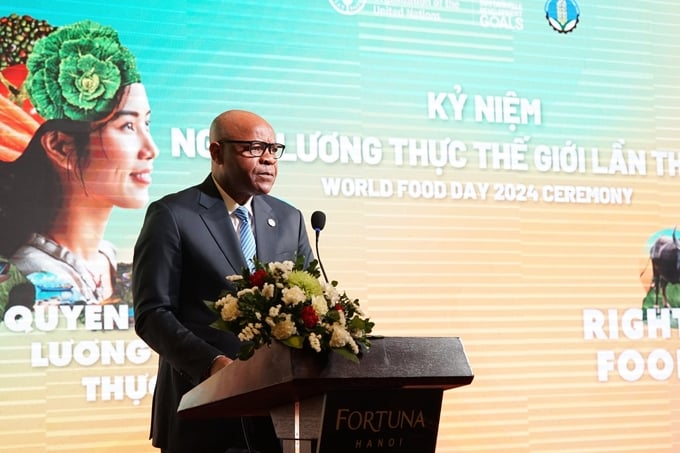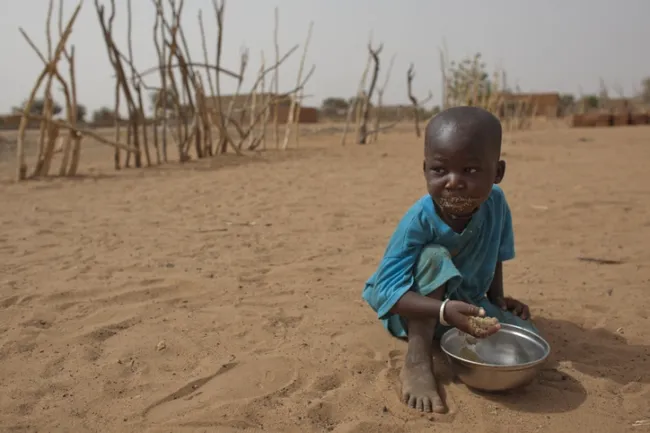May 24, 2025 | 16:22 GMT +7
May 24, 2025 | 16:22 GMT +7
Hotline: 0913.378.918
May 24, 2025 | 16:22 GMT +7
Hotline: 0913.378.918

Mr. Rémi Nono Womdim, FAO Representative in Vietnam, at the 44th World Food Day in Hanoi. Photo: Linh Linh.
On October 18, the Ministry of Agriculture and Rural Development (MARD), in collaboration with the United Nations in Vietnam and the Food and Agriculture Organization of the United Nations (FAO) in Vietnam, jointly organized commemoration of the Word Food Day 2024.
On this occasion, MARD announced the Plan for International Cooperation Promotion in Agriculture and Rural Development to 2030 and vision to 2050; signed the Partnership Agreement for Transparent, Responsible and Sustainable Food Systems Transformation in Viet Nam (FST-Partnership); and kicked off the Joint Programme of United Nations on “Incubation of Innovations in Partnerships and Financing for Agrifood Systems Transformation in Viet Nam”.
The World Food Day 2024, with the theme “Right to foods for a better life and a better future”, offers an opportunity to widely share the global commitment to ensuring all people have the right to adequate food through the transformation of food systems in a sustainable and equitable way.
Mr. Rémi Nono Womdim, FAO Representative in Vietnam, stated that access to food is a fundamental human right, comparable to access to air and water.
On this year’s World Food Day, Mr. Rémi Nono Womdim highlighted the importance of access to food for a better life and future, as well as the significance of food diversity, as it is essential for proper nutrition, and ensuring the availability, accessibility, and affordability of food for everyone.
Globally, about 733 million people are suffering from hunger, primarily due to conflict, climate change, poverty and economic downturns. More than 2.8 billion people cannot afford healthy diets.
Malnutrition in various forms exists in all countries and socioeconomic groups. Poverty and rising food prices are forcing many to turn to less nutritious or cheaper foods.
In Southeast Asia in 2022, 36.3% of the population could not afford a healthy diet. However, Vietnam has a much lower rate of people unable to afford a healthy diet compared to its neighbors, thanks to public policies implemented over the past three decades. Additionally, Vietnam is one of the Southeast Asian countries with the lowest cost of a healthy diet, at $3.96 per person per day.
Climate change affects food safety because it changes how bacteria, parasites and chemicals interact with our food and how quickly they grow and spread. To ensure our food systems are abundant, affordable, and nutritious, we must transform them to be more efficient, inclusive, resilient, and sustainable.

Globally, around 733 million people are suffering from hunger, primarily due to conflict, extreme weather, inequality, and economic downturns. Photo: AFP.
During the ceremony, MARD and FAO in Vietnam also approved the FST-Partnership.
The overall objective of this partnership agreement is to support the implementation of national food systems transformation pathways, contributing to national food security and achieving national and global sustainable development goals by 2030.
In order to translate this vision into concrete activities, the Government developed and adopted the National Pathways for agrifood systems transformation, specifically the Strategy for Sustainable Agricultural and Rural Development for 2021-2030, with a vision to 2050, Decision No. 150/QD-TTg on January 28, 2022. the National Action Plan on food systems transformation towards transparency, responsibility and sustainability in Vietnam by 2030, decision 300/QD-TTg of 28 March 2023.
The National Pathways integrate the right to food across agrifood systems policies and programmes to ensure equal access to an adequate and diverse range of nutritious, safe, and affordable foods for all Vietnamese; enhance public-private partnerships with accountability mechanisms; and the capacity development necessary to transform agrifood systems and achieve sustainable development.
“Together, we are committed to work together to build a better, more sustainable future for all in Viet Nam. We all need to play a role in building a future where everyone can enjoy the right to foods by challenging inequalities, engaging decision makers, making healthy food choices, reducing food waste, caring for natural resources and being compassionate in our actions,” said Mr. Rémi Nono Womdim, FAO Representative in Vietnam.
Transforming agrifood systems will contribute not only to eradicating poverty, improving nutrition and livelihood of the most vulnerable, but also to ensuring these systems are more efficient, inclusive, resilient and sustainable.
FAO remains committed to closely cooperating with Vietnam to jointly transform Vietnam’s food systems. Therefore, Vietnam can accelerate its transformation toward more efficient, inclusive, and sustainable food systems, better production, improved nutrition, a better environment, and better quality of life for everyone, leaving no one behind.
Translated by Kieu Chi

(VAN) In the tranquil wetlands of Van Long, there are quiet souls who guard the forests, nurture the waters, and oversee every bird and troop of langurs as protecting the essence of a living heritage.

(VAN) WWF, GIZ, IUCN, UNDP call for biodiversity conservation and sustainable development must be regarded as a unity in strategies for a green future.

(VAN) On celebration of International Day for Biological Diversity, Deputy Minister Nguyen Quoc Tri called for practical actions to address nature and biodiversity conservation.

(VAN) Dr. Hoang Thi Thanh Nhan – Deputy Director of the Nature and Biodiversity Conservation Agency – highlighted this on the International Day for Biological Diversity, May 22, 2025.
![Ho Chi Minh city adapts to climate change: [2] Accelerating action](https://t.ex-cdn.com/nongnghiepmoitruong.vn/608w/files/chiqk/2025/05/22/4024-4220-bien-doi-khi-hau-1-100626_766.jpg)
(VAN) Clearly recognizing the challenges posed by climate change, Ho Chi Minh city has swiftly shaped its policies and implemented practical solutions to adapt.

(VAN) Rice straw is no longer just a discarded byproduct, but it is becoming a green resource that helps farmers in the Mekong Delta reduce emissions and promote circular, sustainable agriculture.

(VAN) Other Effective Area-based Conservation Measures (OECMs) are solutions that contribute effectively to achieving the goals of the Kunming–Montreal Global Biodiversity Framework.